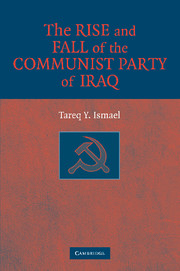Book contents
- Frontmatter
- Contents
- Preface
- 1 The Communist Party of Iraq: Origins and Foundations
- 2 Ascent of the ICP in Iraqi Politics
- 3 Party Rift: The Emergence of the Central Leadership
- 4 Alliance with the Baʿth
- 5 The Rebirth of the Central Leadership in the 1970s
- 6 Crisis: Disintegration or Renewal?
- 7 Conclusion: From Vanguard Activism to Rearguard Opportunism
- Index
1 - The Communist Party of Iraq: Origins and Foundations
Published online by Cambridge University Press: 24 November 2009
- Frontmatter
- Contents
- Preface
- 1 The Communist Party of Iraq: Origins and Foundations
- 2 Ascent of the ICP in Iraqi Politics
- 3 Party Rift: The Emergence of the Central Leadership
- 4 Alliance with the Baʿth
- 5 The Rebirth of the Central Leadership in the 1970s
- 6 Crisis: Disintegration or Renewal?
- 7 Conclusion: From Vanguard Activism to Rearguard Opportunism
- Index
Summary
The introduction of Marxist thought in Iraq must be accredited to Ḥusain al-Raḥḥâl (1901–1981), who, though he never became a communist himself, was the first to introduce Marxist thought into intellectual circles in Baghdad. Al-Raḥḥâl was a high school student in Berlin in 1919 when the Spartacist uprising, an attempt by the Communist Party of Germany (KPD) to seize control of Berlin, took place; this event left a deep impression on him, and kindled his interest in socialism and Marxism. Returning to Iraq a year later, and profoundly affected by the unstable conditions of the country, under British occupation, he gradually started to teach Marxist and socialist thought. However, in his last days he expressed deep disappointment:
With the seeds I have sown and worked so hard to intellectually nurture … I wanted to create an intellectual environment where scientific socialism would be the base of inquiry to understand our backward conditions, but we ended up somewhere else…. The impoverishment of Marxist thought today [1973] is much more alarming because it is much more regressive than it was fifty years earlier.
Iraq Before the First World War
The history of modern Iraq can be traced back to 1749 when the Ottoman Sultan appointed Sulimân Aghâ AbÛ-lailah, a Georgian Mamluk officer who was the governor of Basra (1749–1761), to the position of Wâlî (governor) of Baghdad. This appointment initiated the establishment of a semi-autonomous state in Iraq under Mamluk suzerainty.
- Type
- Chapter
- Information
- The Rise and Fall of the Communist Party of Iraq , pp. 1 - 70Publisher: Cambridge University PressPrint publication year: 2007



